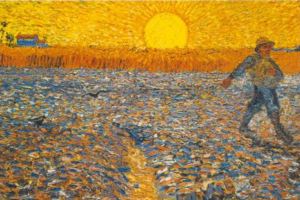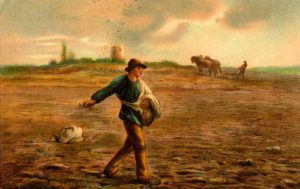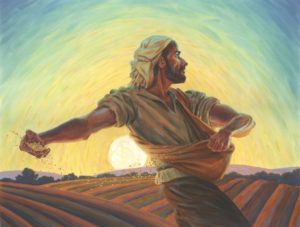The Lord be with you
Two of the appointed Bible readings for this coming Sunday (Pentecost 6, July 16, 2017) are blatantly about the Word of God (Isaiah 55:10-13; Matthew 13:1-9, 18-23). As I expect will be the case in many of our sister congregations, we will be singing “Almighty God, Your Word Is Cast” (Lutheran Service Book 577).
“Almighty God, Your Word Is Cast” was written by John Cawood (1806-1876). He wrote 17 hymns, but never published any of them. This hymn, like all his hymns, was published by others. It is popular only in Lutheran circles and is the only Cawood hymn in our hymnal. The words are:
 Almighty God, Your Word is cast
Almighty God, Your Word is cast
Like seed into the ground;
Now let the dew of heav’n descend
And righteous fruits abound.
Let not the sly satanic foe
This holy seed remove,
But give it root in ev’ry heart
To bring forth fruits of love.
Let not the world’s deceitful cares
The rising plant destroy,
But let it yield a hundredfold
The fruits of peace and joy.
So when the precious seed is sown,
Life-giving grace bestow
That all whose souls the truth receive
Its saving pow’r may know.
The three key Bible passages we will use in considering the hymn follow.
Matthew 13:3–9, 18–24
3 And he [Jesus] told them many things in parables, saying: “A sower went out to sow. 4And as he sowed, some seeds fell along the path, and the birds came and devoured them. 5Other seeds fell on rocky ground, where they did not have much soil, and immediately they sprang up, since they had no depth of soil, 6but when the sun rose they were scorched. And since they had no root, they withered away. 7Other seeds fell among thorns, and the thorns grew up and choked them. 8Other seeds fell on good soil and produced grain, some a hundredfold, some sixty, some thirty. 9He who has ears, let him hear.” …
[In verses 10-17, Jesus explains the general purpose of parables.]
18 “Hear then the parable of the sower: 19When anyone hears the word of the kingdom and does not understand it, the evil one comes and snatches away what has been sown in his heart. This is what was sown along the path. 20As for what was sown on rocky ground, this is the one who hears the word and immediately receives it with joy, 21yet he has no root in himself, but endures for a while, and when tribulation or persecution arises on account of the word, immediately he falls away. 22As for what was sown among thorns, this is the one who hears the word, but the cares of the world and the deceitfulness of riches choke the word, and it proves unfruitful. 23As for what was sown on good soil, this is the one who hears the word and understands it. He indeed bears fruit and yields, in one case a hundredfold, in another sixty, and in another thirty.”
Mark 4:3–9, 13–20
3 “Listen! Behold, a sower went out to sow. 4And as he sowed, some seed fell along the path, and the birds came and devoured it. 5Other seed fell on rocky ground, where it did not have much soil, and immediately it sprang up, since it had no depth of soil. 6And when the sun rose, it was scorched, and since it had no root, it withered away. 7Other seed fell among thorns, and the thorns grew up and choked it, and it yielded no grain. 8And other seeds fell into good soil and produced grain, growing up and increasing and yielding thirtyfold and sixtyfold and a hundredfold.” 9And he said, “He who has ears to hear, let him hear.” …
[In verses 10-12, Jesus explains the general purpose of parables.]
13 And he said to them, “Do you not understand this parable? How then will you understand all the parables? 14The sower sows the word. 15And these are the ones along the path, where the word is sown: when they hear, Satan immediately comes and takes away the word that is sown in them. 16And these are the ones sown on rocky ground: the ones who, when they hear the word, immediately receive it with joy. 17And they have no root in themselves, but endure for a while; then, when tribulation or persecution arises on account of the word, immediately they fall away. 18And others are the ones sown among thorns. They are those who hear the word, 19but the cares of the world and the deceitfulness of riches and the desires for other things enter in and choke the word, and it proves unfruitful. 20But those that were sown on the good soil are the ones who hear the word and accept it and bear fruit, thirtyfold and sixtyfold and a hundredfold.”
Romans 1:16
16For I am not ashamed of the gospel, for it is the power of God for salvation to everyone who believes, to the Jew first and also to the Greek.
 Jesus often taught through parables and many of them focused on the Kingdom of God. Such is the case here (notice Matthew 13:19). The word “kingdom” is a bit tricky. When we hear the word we tend to think in geopolitical terms (the kingdom of France, England, etc. that can be located on a map). But Jesus isn’t speaking of a geopolitical kingdom (Mark 10:15; Luke 6:20; etc.). In stead of thinking of the Kingdom of God in terms of dirt owned by God (after all, that would be the entire world (Genesis 1:1; Psalm 47:7)), we are to think in terms of the rule of God. The Kingdom of God is found wherever there is true faith in the Triune God.
Jesus often taught through parables and many of them focused on the Kingdom of God. Such is the case here (notice Matthew 13:19). The word “kingdom” is a bit tricky. When we hear the word we tend to think in geopolitical terms (the kingdom of France, England, etc. that can be located on a map). But Jesus isn’t speaking of a geopolitical kingdom (Mark 10:15; Luke 6:20; etc.). In stead of thinking of the Kingdom of God in terms of dirt owned by God (after all, that would be the entire world (Genesis 1:1; Psalm 47:7)), we are to think in terms of the rule of God. The Kingdom of God is found wherever there is true faith in the Triune God.
The seed in the parable is the “Word” of the kingdom. It is through this Word that Christ builds his Kingdom. In Jesus’ parable, the Word does it all. As Saint Paul told the Romans, “For I am not ashamed of the gospel, for it is the power of God for salvation to everyone who believes, to the Jew first and also to the Greek” (Romans 1:16). Theologically we understand that the Word accomplishes its work because the Holy Spirit works through the Word. So Saint Paul calls the Word the “sword of the Spirit” (Ephesians 6:17). This is why, in Lutheran circles, we call the Word of God a “means of grace.”
The “seed” is cast far more indiscriminately than any actual farmer would. This reflects that we are to proclaim the Gospel to “all nations” (Matthew 28:19). Again, this reflects that the Kingdom of God knows no human geopolitical boundaries.
In this general sharing of the Gospel of salvation by grace through faith in Jesus, the seed falls on various kinds of soil. Some of that soil is “good.” What is “good” soil? Do we have to do something to make ourselves fitting recipients of the Gospel? The consistent message of the Bible is that salvation is free and we do nothing to merit it (Ephesians 2:8-9). The person who is “good soil” is the “one who hears the word and understands it.” God, in his unfathomable way, chose those who would come to believe in His Son “before the foundation of the world” (Ephesians 1:4). Yes! We are all sinners, but when you believe these truths, through God’s grace and with the help of the Holy Spirit, you can confidently say, “I am good soil.” If you ever doubt it, just look to the cross of Jesus and ask yourself, “Do I believe that Jesus died for all sinners, including myself?” The answer, “Yes, I do,” is given by those who are “good soil.”
 Those who receive the Word of the Kingdom in faith “bears fruit and yields, in one case a hundredfold, in another sixty, and in another thirty.” What does it mean to yield fruit? Paul wrote to the Galatians, “the fruit of the Spirit is love, joy, peace, patience, kindness, goodness, faithfulness, gentleness, [and] self-control” (Galatians 5:22-23). In other words, the fruit is a life conformed into the image of Jesus (Romans 12:2; 2 Corinthians 3:18). No matter what your vocations are, the fruit of the Spirit means living as a Christian in those vocations. Some people have more opportunities than others because they have more vocations, but some we have in common are neighbor, family member, church member, and citizen of our country.
Those who receive the Word of the Kingdom in faith “bears fruit and yields, in one case a hundredfold, in another sixty, and in another thirty.” What does it mean to yield fruit? Paul wrote to the Galatians, “the fruit of the Spirit is love, joy, peace, patience, kindness, goodness, faithfulness, gentleness, [and] self-control” (Galatians 5:22-23). In other words, the fruit is a life conformed into the image of Jesus (Romans 12:2; 2 Corinthians 3:18). No matter what your vocations are, the fruit of the Spirit means living as a Christian in those vocations. Some people have more opportunities than others because they have more vocations, but some we have in common are neighbor, family member, church member, and citizen of our country.
Not all, however, who hear the Word of the Kingdom come to faith. We can rejoice that we are not the hard path from which the devil plucks the seed away immediately, but there are other dangers. Many claim that the greatest threat to Christianity in the Western world is from our own society, coming when the Word falls among “thorns” that choke it. Jesus said of the thorns among which the seed falls that it represents, “The cares of the world and the deceitfulness of riches and the desires for other things enter in and choke the word, and it proves unfruitful.”
It should not be difficult to think of examples of how Western Culture seeks to separate us from Christ and his Word. This is, of course, true of all human cultures, but we know our own best. Our culture’s approach to marriage and marriage relationships, family, what is or is not important, pride, greed, even the value of human life, is so often at odds with the Kingdom of God. Because it is our culture, it is often difficult for us to see the problems.
Someone once said that if fish could engage in scientific pursuits, the last thing they would discover is water. Why? Because it would be so all pervasive that it would be difficult to think of it independently. So it is with culture. It is so all pervasive that we often have a hard time seeing how it impacts our lives.
In fact, the only reliable way to see how culture shapes us is to be grounded in the Word of God. Then the Holy Spirit can truly correct our vision. A little seed has great power. From a small acorn grows a might oak. But the seed of God’s Word has infinitely more power. God promises that it will not return empty but accomplish His purpose (Isaiah 55:11). When that Word encompasses the Gospel, the Good News about Jesus paying for our sins on the cross, it takes us from being lost to being found, from being dead to being alive, from being destined for hell to being citizens of the Kingdom of God. In other words, it is the power of God for salvation for all people. Through the Gospel, the Holy Spirit brings faith. God, in His grace, forgives our sins and gives us heaven as our inheritance.
Now, go back to the beginning of this study and re-read the words of our hymn. How do you see the study’s thoughts reflected in Cawood’s words?
Blessings in Christ,
Pastor John Rickert
(Inspiration for this study was taken from Quick and Easy Bible Studies, Concordia Publish House.)
